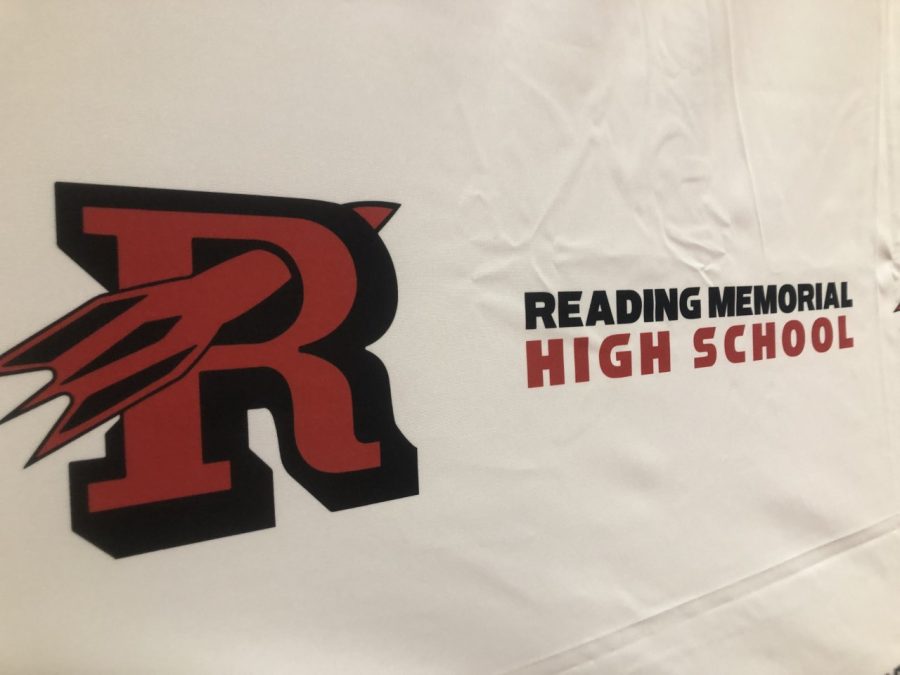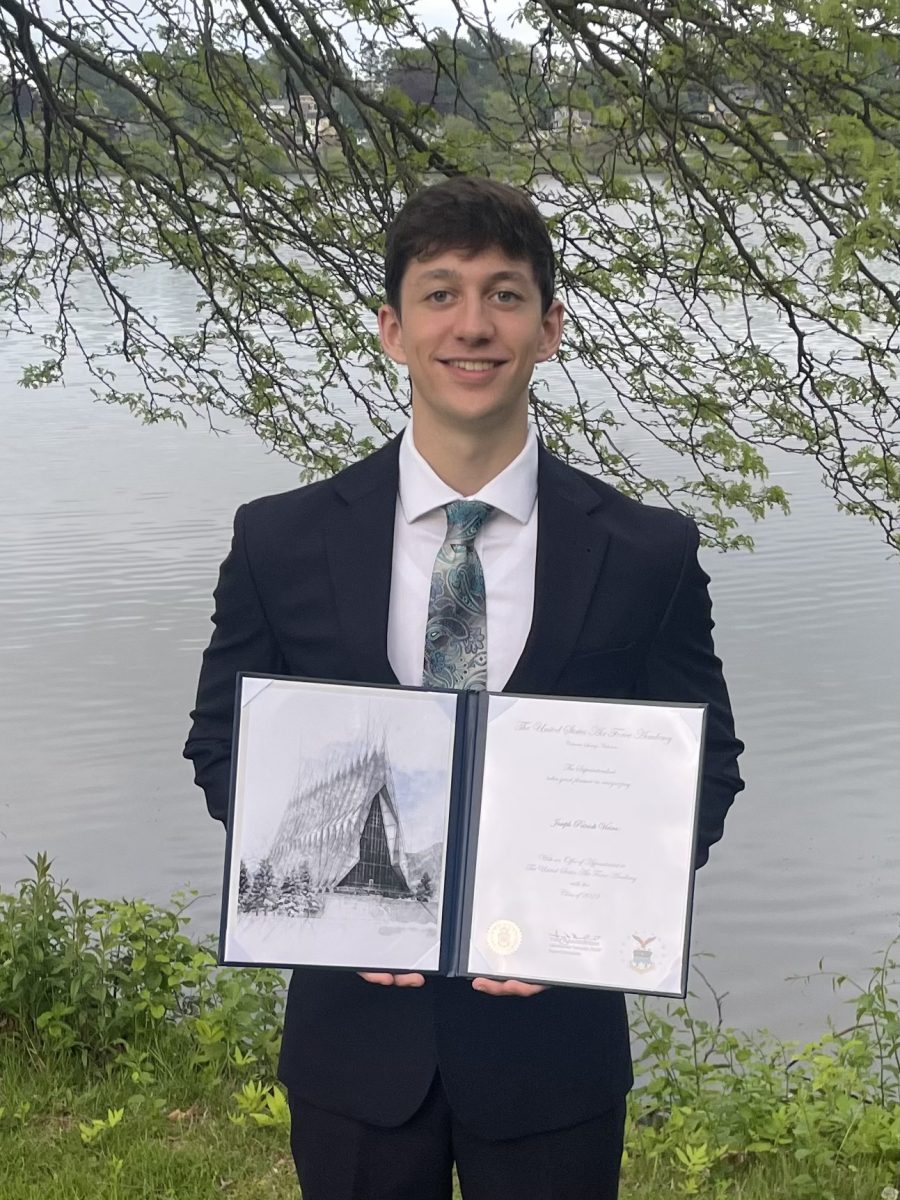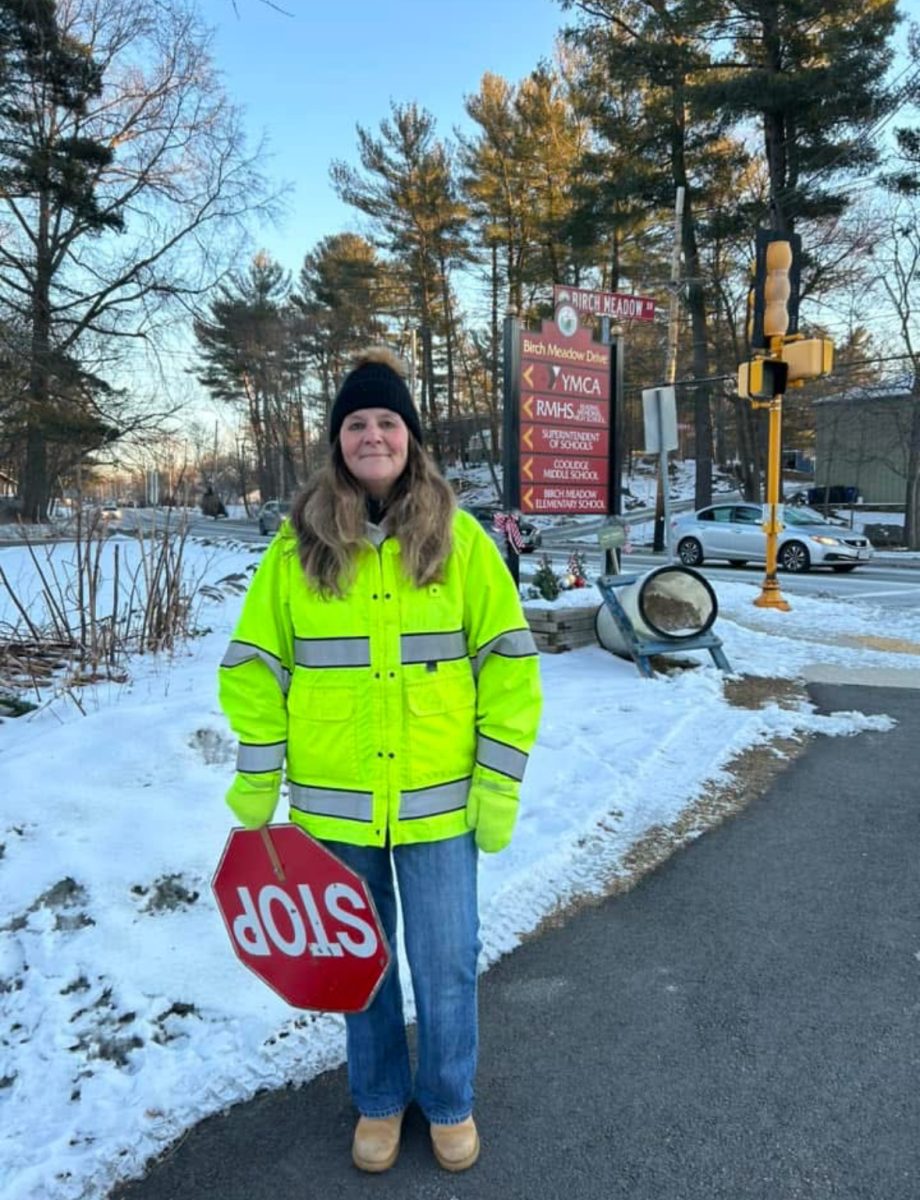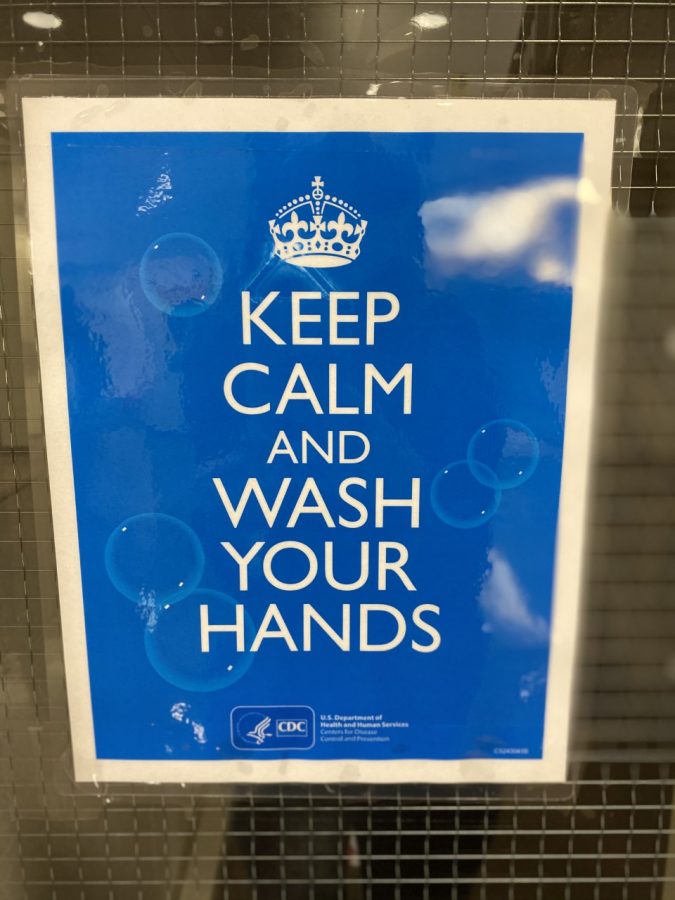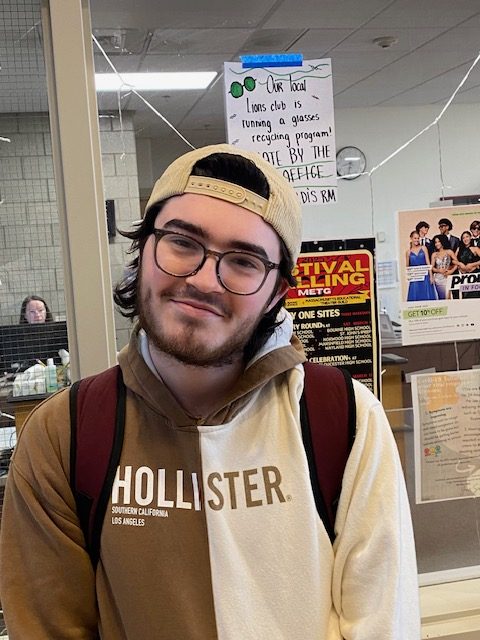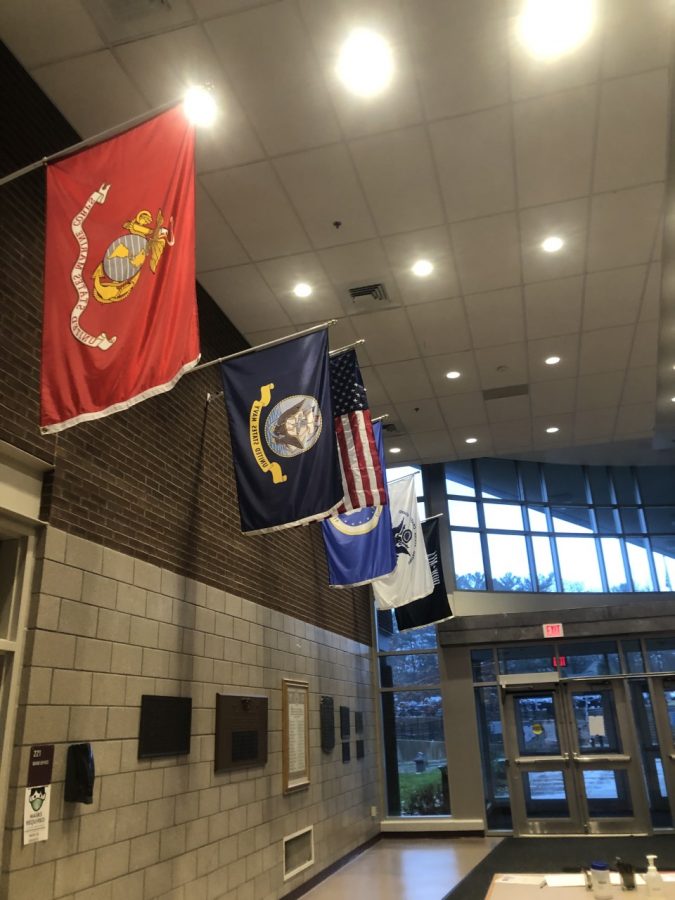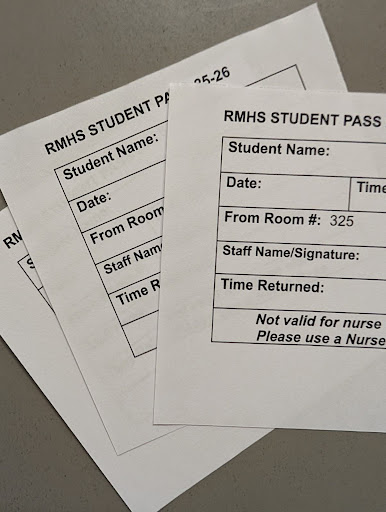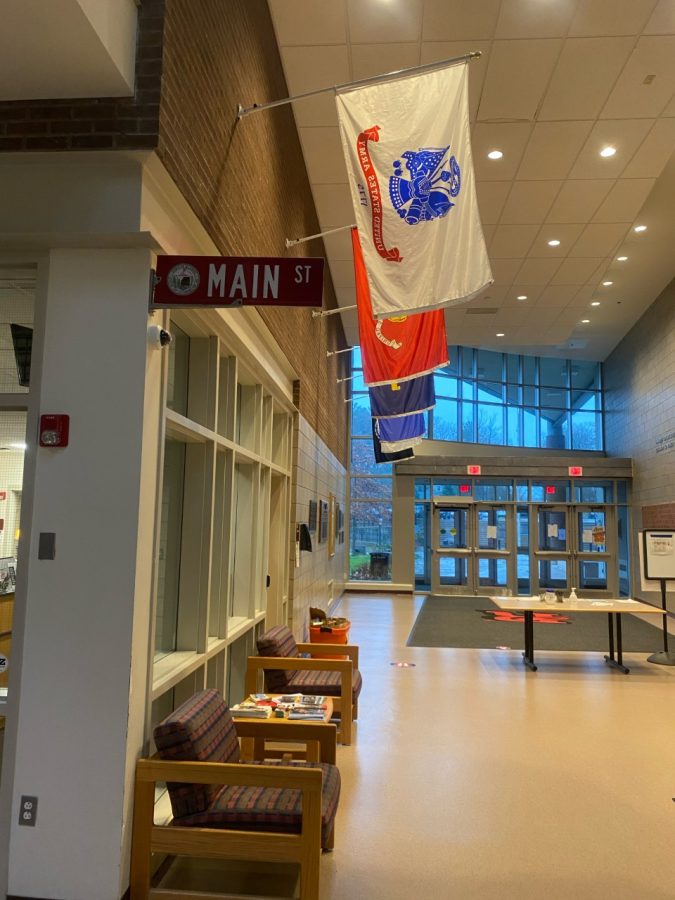Ms. Lombardo’s C-block journalism students collaborated on the reporting, research, and writing for this story.
This year, RMHS is continuing the newly expanded Senior Internship Program, running through seniors’ fourth quarter. Seniors will be able to work at approved internship sites instead of attending school while being paid for their work. This year, approximately 190 seniors are expected to participate, an increase from roughly 80 last year.
Participating seniors will be required to work a minimum of 20 hours a week at their job sites. At the end of the internship, students will be required to do a final project of the student’s choosing in order to receive credit for the fourth quarter.
The pay that the seniors will get will vary depending on where they choose to work. If the internship they decide on does not pay them directly, then a grant will pay them $15 per hour for 100 total hours. Students who are interning in the elementary and RISE preschools will be paid the same amount by a separate grant called the High School Internship in Education Project, secured through the Department of Elementary and Secondary Education.
For internships that are STEM-related, grants given by Mass Hire last year gave over $100,000 to the school for student internships. Principal Callanan says that the program aims to have all internships paid for “because we think it makes it more accessible to students, and we think you should get paid for your work.” Many internships will also be paid by their chosen sites. According to Ms. Rondeau, RMHS Guidance Counselor and coordinator of this year’s senior internship program, “We have about 70 spots for those two grants [STEM and Education] this year, and then with students finding their own funding, we’ll have about 120-130 [total] paid internships this year.”
According to Principal Callanan, the goal of the program is to “put students in a situation to try something out that they think that they’re interested in, or that they know that they’re pursuing after high school, either in college or as a job.” She also says that internships should “give[s] them a little personal growth.”
In addition, Ms. Callanan believes that an internship can help a student narrow down their interests. She said that internships allow students to see what they like and don’t like, so “you might have enough time to flip around what you’re taking in college before then.” She feels that it’s important to help inform students’ choices now so they can make better choices for college.
In order to participate in the program, seniors need a cumulative grade of C- or above and have fewer than 5 unexcused absences during the second semester, though Ms. Rondeau says that there is a buyback program, which allows students to buy back absences in any class per semester. To do this, students need to come into the class they missed consistently for 5 days and have their teacher sign their signature.
Seniors who take AP classes are required to stay in those courses until their AP exams, but they can still participate in the program.
History of the Internship Program
Before Principal Callanan was at RHMS, only a handful of seniors did internships. “There was Miss Fiorello in the Wellness Department [who] used to participate in education internships, but other than that, there weren’t very many internships,” Ms. Callanan said.
Last year, now-principal Callanan, who has prior experience with internships in a different school district, and assistant principal Ms. Buckley came together to greatly increase the number of students who were interning.
This is the second year of the expanded internship program in Reading. According to Principal Callanan, “last year, we had almost 90” participants. This year, Principal Callanan predicts nearly 200 students will do the internship, with over 130 attending the internship fair on February 29th.
The number of participating businesses has also increased. According to Ms. Callanan, “Last year, I think we only had maybe five to 10 businesses come to the Internship Fair and present opportunities to students.” This year at the internship fair, “we had 25 businesses here, but we have more that are participating,” she said.
The funding for the internship students’ pay has also increased. “Last year, we got funding for about 50 to 60 internships. This year, we have closer to 70,” according to Ms. Rondeau.
Questions of Fairness for all Seniors
Not all seniors will be participating in the program. Those students will have to attend all of their classes until the last day for seniors, May 17. The reasons for not participating range from students who are taking several AP classes to others who felt that there weren’t internships available in the career areas they were interested in.
Will Angelou (‘24) isn’t doing an internship because he is taking a lot of AP classes and can not fit it in his schedule, but he said, “I really wish I could do an internship, I want to do one, it’s a really good opportunity to learn about what job you’re going to do in the future.”
Another student, Lauren Scales (‘24), is not doing an internship because it isn’t flexible enough with her schedule and AP class. She says, “I’m in an AP class and it definitely makes my schedule a bit more difficult. I feel like if I wasn’t in AP Bio, then I would do an internship.”
She says, however, she would also like to do an internship. She is interested in “a major in either special education or early education. And I feel like an internship could definitely help [me] get better at that.”
Another student, Anjali Gnanaratnam (24’), is interested in doing social work or nonprofit management. She said that she believes an internship would help her with that but said, “I just haven’t found one yet that I feel fits that.”
She said, “They have like a good amount of options, if they had more options spanning more different career paths, I think that’d be nice.”
Regarding the students who aren’t able to participate, Ms. Rondeau responded: “I don’t think I would say it’s not fair, I think that they can still do the internship program, because we have a lot of flexibility on when they can do their hours,” meaning that the students who can’t drop classes can do their internships when they can fit it into their schedule.
According to Ms. Callanan, the school is working to “hire students that kind of have a tight schedule to be interns with our IT department. So they’ll provide IT help or do jobs for our IT department… in between their AP classes” in order to have a fair chance at an internship.
Ms. Callanan believes that kids who don’t get internships will “realize that most of their class is doing internships, then they come to us at the last minute and say, ‘Oh, I changed my mind. Can I please do an internship?’ And I always encourage kids to apply from the get go.”
Accountability Questions
During last year’s internship program, it was rumored that some students did not actually report to their jobs or worked fewer hours than required, even though they were paid for 20 hours per week by the grant. Ms. Callanan, however, believes this is “somewhat of a false narrative.”
She believes this because she said the administration “had kids do timesheets, every single week, we checked in with their hosts every single week. And they had to do a presentation at the end that included photos and accountability of everything they did every single week.”
While she admitted that some students likely weren’t being responsible, she believes that most students were working and fulfilling the requirements.
For those current seniors who are considering not working and getting paid to stay at home this year, Ms. Callanan said, “Their internship can be pulled if that’s the case, and they would not be able to do it. And they’d have to go back into their classes.”
“Essentially, if you’re saying that you’re doing work, and you’re not doing it, and you’re getting paid for it, it’s fraud, so that’s pretty high threshold of dishonesty,” she said.
To ensure students’ accountability at their jobs, Ms. Rondeau said administrators will have a similar system to last year. They will “have weekly check-ins with all of the business leaders and site partners…we’ll have weekly check-ins with those site partners to ensure the hours are being met. And then we will also have time cards that the students have to come back in and turn in each week to indicate what hours and days they were working.”
Senior teachers’ opinions of the program
Seniors are not the only people in the school who are affected by the impact of the internship program. Teachers, particularly those who teach seniors, are often greatly affected by the number of students who will be leaving for the fourth quarter. Ms. Baskin, who teaches English, says that she is “extremely stressed about it.”
Ms. Baskin has a senior film and literature class this semester. She said, “I have 14 students in it. I suspect that probably about 11 of them are going on internships. What am I teaching to three kids?”
Because her class is only a semester long, she said the students who leave have “only been in class for a quarter. That’s half the class. So that’s a big deal. And there’s a lot of valuable stuff that I wish I could share with those students that leave on internship.”
She also feels that the program “promotes an inequity, because the kids who stay and finish out the quarter are still responsible for doing assignments and getting things done and writing essays and keeping their grades up, and the kids who leave are not.”
In future years, Ms. Baskin would like to see “some kind of robust vetting system for the internships” and to provide “an alternative for kids who don’t want to go into internship or can’t go on internship.”
Spanish teacher Ms. Donahue has a different outlook on the senior internship program, though she does not teach any full senior classes herself.
She said, “I think if I were to teach a full class that was basically a senior class, you would continue the class along. It makes it more relaxed, so that people that move onto internships can do their thing and the people that are in class, feeling like they have to do a lot of heavy-duty work, [the teacher can] make it more engaging for them.”
Ms. Donahue has hope for the program and believes that it is a great opportunity for growth and a way to get ahead in the working world. She doesn’t feel as concerned that students would be missing out on in- class learning and lessons.
She admitted that seniors on internships will “miss out on some learning opportunities that are happening, but they’re also having an extra opportunity that they wouldn’t have otherwise.”
Seniors anticipate the internship experience
Students who have chosen internships agree with Ms. Donahue; they think it will be a valuable experience. Alex Zhang (‘24) is looking at different engineering internships such as the Reading Light Department and Building Math Careers. He said,”I feel like it will definitely help me gain work experience since this is mostly engineering. I definitely want to try and gain some real life hands-on experience with something that will help me in the future with engineering.”
Matthew Jones (24’), who is working for a company called Tax Collectors, stated that he is looking forward to getting out of school early this year. He said, “I mean, it’s hard to kind of stay focused in class. So I might as well go get a little bit of money and do something useful that you’ll use later on, but you’re not distracted in school, knowing you only have a couple of months left. It’s good to just get out a little early.”
But, he also said he had “mixed feelings. It’s kind of sad. This is the last time we’ll be in school. He said he is “Sad to go off but excited to look forward to the future and my future plans.”
When asked what he’s looking to get out of the internship, he said “I mean, knowing tax [preparation rules] is a huge part of adulthood and stuff we’ll need to know.”
Future of the program
In the future, Mrs.Callhan thinks that the internship program is going to bloom even further as the years go on. “Eventually, it will also be part of the Innovation Career Pathways that our freshmen and sophomores opted into this year that they will be required to either do an internship or a capstone class,” she said.
Ms. Rondeau also wants to see the program continue to grow.
“I’m hoping that each year we’ll build more and more partnerships within the community to offer more spots to kids. In a perfect world, we would have 150 to 200 spots for every single kid. But it’s nearly impossible to get that many businesses to get on board with this, because we’re so early in the program. So I hope that over the years, we will expand to include more types of sites,” she said.
She also said that the goal of the internship program is for 100% of internships to be related to the student’s career, but “even if it’s not directly related to your career path, just getting out into the workforce, working, dealing with people, and learning those skills is super important.”
